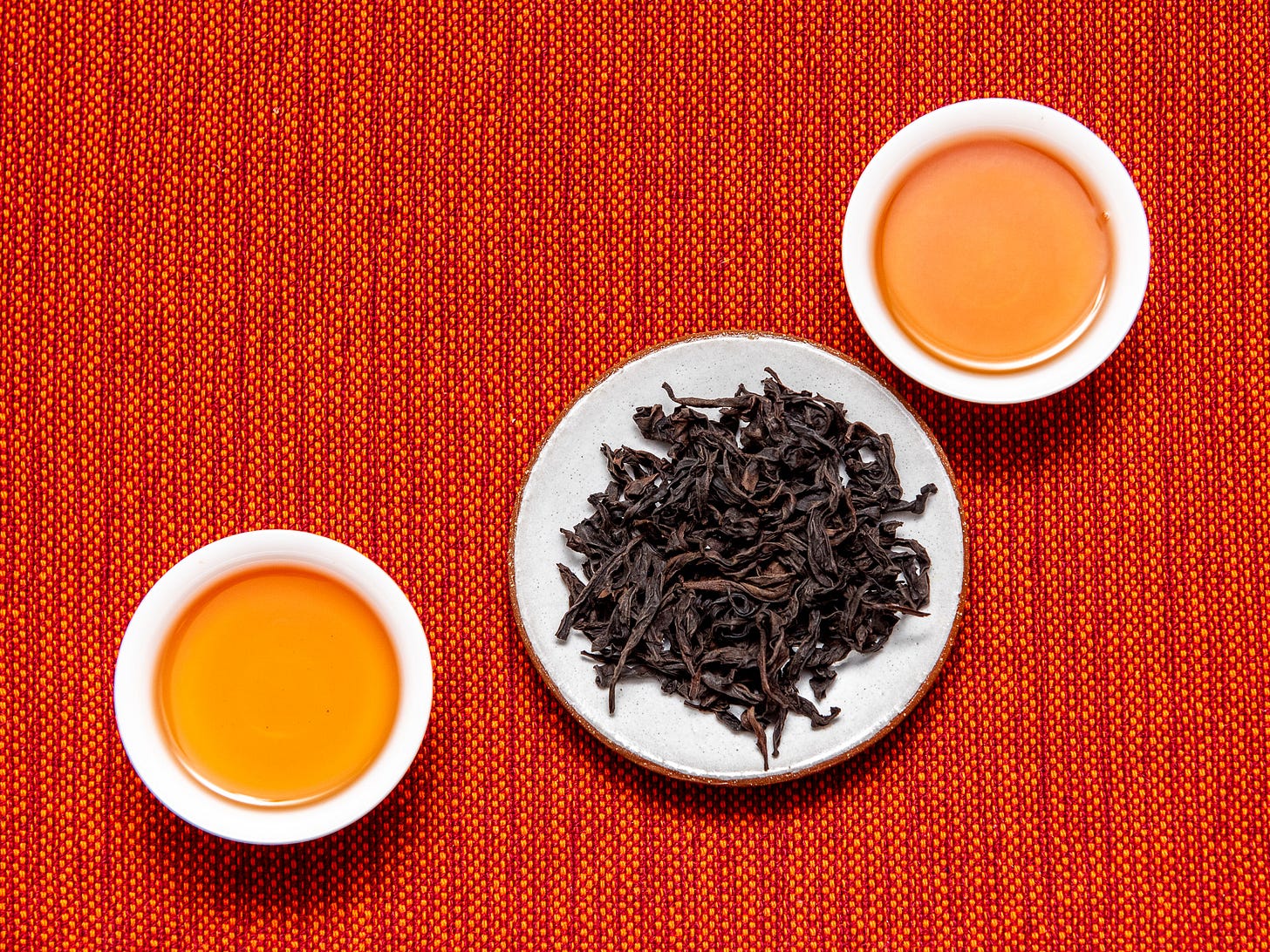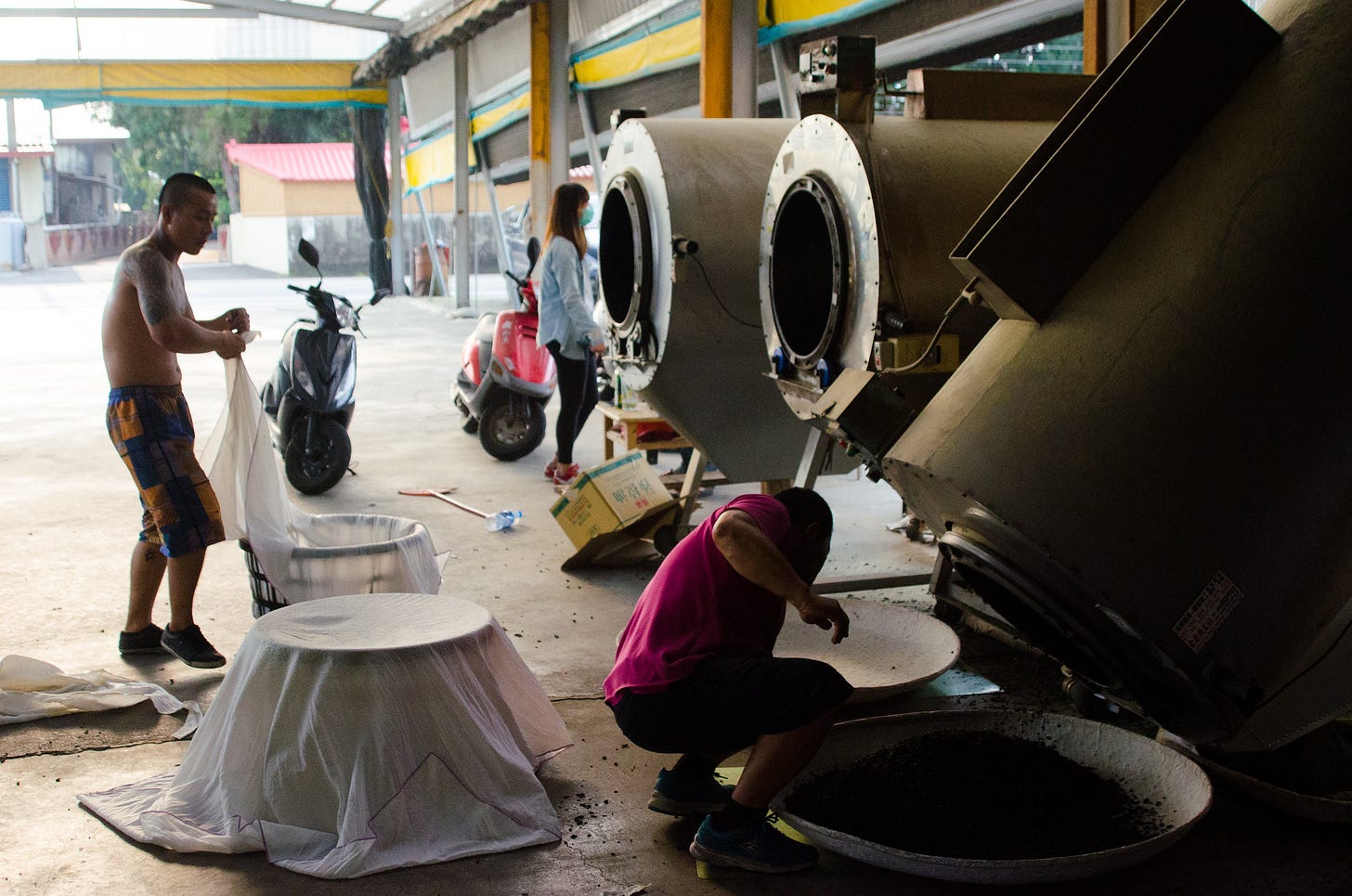This oolong tastes like gender
Cinnamon-sweet cliff tea + the phenomenon of tea bros.
We’re three weeks into Leafhopper’s run and have already reached more than 500 subscribers. Thank you all for joining the journey—I’m thrilled that you’re here. If you like what you see and want to support this project, I’d be grateful if you shared this post to spread the word.
This week we dive into the tricky ways that gender lines intersect the tea world, but first let’s taste a scrumptious oolong that’s just the thing for sub-zero temperatures.
Call it rock candy
The tea: Rou Gui Tian Xian yan, sold by Wuyi Origin. $66 for 100g.
The Wuyi mountains in Fujian Province are famous for their rocky cliffs, dramatic views, primeval biodiversity, and a beloved class of oolongs alternately called cliff tea, yancha, or Wuyi rock tea. It took me a while to warm to this style. Good yancha has so much packed in the leaf that the experience can be overwhelming at first. There’s a toffee sweetness similar to toasted Marcona almonds or amontillado sherry. But also a strong mineral presence, as if you licked an oyster shell. The tea is usually subjected to a heavy roast that deepens and refines these flavors while adding a smoldered intensity. Brew some yancha, then leave the room for five minutes. When you return, you won’t believe how good it smells.
Good yancha doesn’t come cheap. Wuyi teas are in high demand in the Chinese market, and the really good stuff can get astronomically expensive. For fully handmade tea from famous gardens within the protected nature reserve, the question is less “how much” and more “do you have a connection to a seller.” Not that that stops vendors who enjoy a flexible relationship with the truth, of course.
The good news is that there’s plenty of more affordable cliff tea in the greater Wuyi area. It may not be fully handmade or a famous cultivar. It may be more Wuy-ish than Wuyi proper. But it can be good to drink. In truth, you can get drinkable yancha style teas at Chinese supermarkets. They won’t have as much going on or last as many steeps, but they’re good to toss in a thermos and slurp in the office. I like to make ice cream with them.
The source: Wuyi Origin is the wife-and-husband project of Cindy Chen and Mr. Zhou. Chen’s family is in the Wuyi tea business, and Zhou’s family makes tea on Phoenix Mountain. The company sells teas from both regions. Isn’t that sweet? I don’t have much personal experience with this seller, other than the sense they’re well regarded in the Western tea market. I can say I’ve enjoyed everything I’ve tried from them and plan to order again. The E-packet shipping from China was prompt and inexpensive.
To brew: Good rock tea can be brewed in many ways (in a large pot, mug, or thermos), but it shines in smaller pots (60 to 200 milliliters) with repeated steepings. Fill a pot or gaiwan 1/4 to 1/2 of the way full with leaf. If you’re new to this, it will look like way too much tea. Trust the process. Take the time to preheat your pot and cups. Bring water to a rolling boil. The game is hot, hot water and short brew times. Rinse the leaves and decant the rinse immediately. Then start with 5 to 10 second steeps and lengthen subsequent infusions as needed. Once you’ve gotten a handle on this method, try stuffing your pot to the brim with leaf. The resulting brew is rocket fuel, but very good.
You’ll find sweet fruity flavors and a heady cinnamon spice; “rou gui” literally means “cinnamon.” The roast may ring down your throat like a chime. Also pay attention to how the brew feels in your mouth. It clings to my cheeks and tongue, reverberating sweetness. I salivate and reach for another cup. Suddenly, ten steeps aren’t enough.
Thanks for reading the free digest of this week’s Leafhopper. The deep dive essay below is exclusively for paid subscribers. Upgrade your subscription for full access to this deep dive and future editions. You can also get a taste with a 7-day free trial. If you can't afford the cost of a subscription but have a passion for tea and desire to learn more, email me at max.falkowitz@gmail.com and we can make it happen.
On tea bros, and other gender dynamics
It was in a Chinatown shop that I encountered my first tea bros. Three of them burst into the small room, clad in puffy parkas, and the leader announced, “yooo, the first thing we’re gonna do is drink all the milk oolong.” They couldn’t have been older than 20 and their goofy enthusiasm was infectious. Each jar of tea they sniffed elicited its own “yooo.” “That’s sick,” one of them said to the others while gesturing at the jasmine pearls.







